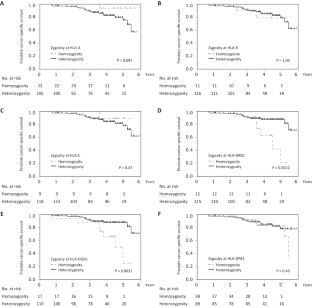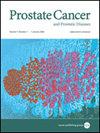人类白细胞抗原基因型对接受初级雄激素剥夺疗法的晚期前列腺癌患者生存期的影响:KYUCOG-1401-A 研究。
IF 5.8
2区 医学
Q1 ONCOLOGY
引用次数: 0
摘要
背景:免疫编辑(人类白细胞抗原(HLA)在其中发挥着关键作用)被认为塑造了人类癌症的面貌。本研究前瞻性地调查了HLA基因家族性是否与晚期前列腺癌患者接受初级雄激素剥夺疗法的预后有关:KYUCOG-1401-A与一项前瞻性临床试验(KYUCOG-1401)同时进行。在加入 KYUCOG-1401 并接受初级雄激素剥夺疗法治疗的患者中,仅包括日本患者。测定了 HLA-A、B、C、DRB1、DQB1 和 DPB1 的基因型。评估了 HLA 基因型差异对进展时间、前列腺癌特异性生存率和总生存率的影响:结果:在127名患者中,HLA-DRB1(HR,95% CI;4.05,1.54-10.7,P = 0.0047)和HLA-DQB1(HR,95% CI;3.75,1.47-9.58,P = 0.0058)的同种性与前列腺癌特异性死亡风险的增加有关。HLA-DQB1的HLA进化分歧得分较高的患者(HR,95% CI;0.90,0.82-0.97,P = 0.0093)前列腺癌特异性死亡风险较低。在前列腺癌队列中,CD4-low和CD8-low肿瘤中的雄激素反应基因组上调,而在膀胱癌和肾癌队列中则没有:这项研究表明,包括HLA-DRB1和HLA-DQB1在内的HLA-II位点的多样性在晚期前列腺癌的生存中起着重要作用,有助于改善晚期前列腺癌的风险分层。此外,研究还表明,CD4+ T细胞在雄激素剥夺疗法中发挥着重要作用,这表明针对CD4+ T细胞的免疫疗法在前列腺癌的治疗中大有可为。本文章由计算机程序翻译,如有差异,请以英文原文为准。


The effect of human leukocyte antigen genotype on survival in advanced prostate cancer treated with primary androgen deprivation therapy: the KYUCOG-1401-A study
Immune editing, in which human leukocyte antigens (HLA) have critical roles, has been suggested to shape the landscape of human cancer. This study prospectively investigated whether HLA gene zygosity is associated with the prognosis of primary androgen deprivation therapy in advanced prostate cancer. KYUCOG-1401-A was conducted in conjunction with a prospective clinical trial (KYUCOG-1401). Among the patients enrolled in KYUCOG-1401 and treated with primary androgen deprivation therapy, only Japanese patients were included. HLA genotypes of HLA-A, B, C, DRB1, DQB1, and DPB1 were determined. The effect of divergence of HLA genotypes on time to progression, prostate cancer-specific survival, and overall survival was evaluated. Among 127 patients, homozygosity for HLA-DRB1 (HR, 95% CI; 4.05, 1.54–10.7, P = 0.0047) and HLA-DQB1 (HR, 95% CI; 3.75, 1.47–9.58, P = 0.0058) was associated with an increased risk of prostate cancer-specific mortality. Patients with higher HLA evolutionary divergence scores at HLA-DQB1 (HR, 95% CI; 0.90, 0.82–0.97, P = 0.0093) had lower risks of prostate cancer-specific mortality. Androgen-responsive gene sets were upregulated in CD4low and CD8low tumors in the prostate cancer cohort, but not in the bladder and kidney cancer cohorts. This study suggested that the diversity of HLA-II loci including HLA-DRB1 and HLA-DQB1 plays an important role in advanced prostate cancer survival, contributing to improved risk stratification in advanced prostate cancer. Moreover, it was shown that CD4+ T cells play an important role in androgen deprivation therapy, suggesting that immunotherapy targeting CD4+ T cells is promising for prostate cancer.
求助全文
通过发布文献求助,成功后即可免费获取论文全文。
去求助
来源期刊

Prostate Cancer and Prostatic Diseases
医学-泌尿学与肾脏学
CiteScore
10.00
自引率
6.20%
发文量
142
审稿时长
6-12 weeks
期刊介绍:
Prostate Cancer and Prostatic Diseases covers all aspects of prostatic diseases, in particular prostate cancer, the subject of intensive basic and clinical research world-wide. The journal also reports on exciting new developments being made in diagnosis, surgery, radiotherapy, drug discovery and medical management.
Prostate Cancer and Prostatic Diseases is of interest to surgeons, oncologists and clinicians treating patients and to those involved in research into diseases of the prostate. The journal covers the three main areas - prostate cancer, male LUTS and prostatitis.
Prostate Cancer and Prostatic Diseases publishes original research articles, reviews, topical comment and critical appraisals of scientific meetings and the latest books. The journal also contains a calendar of forthcoming scientific meetings. The Editors and a distinguished Editorial Board ensure that submitted articles receive fast and efficient attention and are refereed to the highest possible scientific standard. A fast track system is available for topical articles of particular significance.
 求助内容:
求助内容: 应助结果提醒方式:
应助结果提醒方式:


